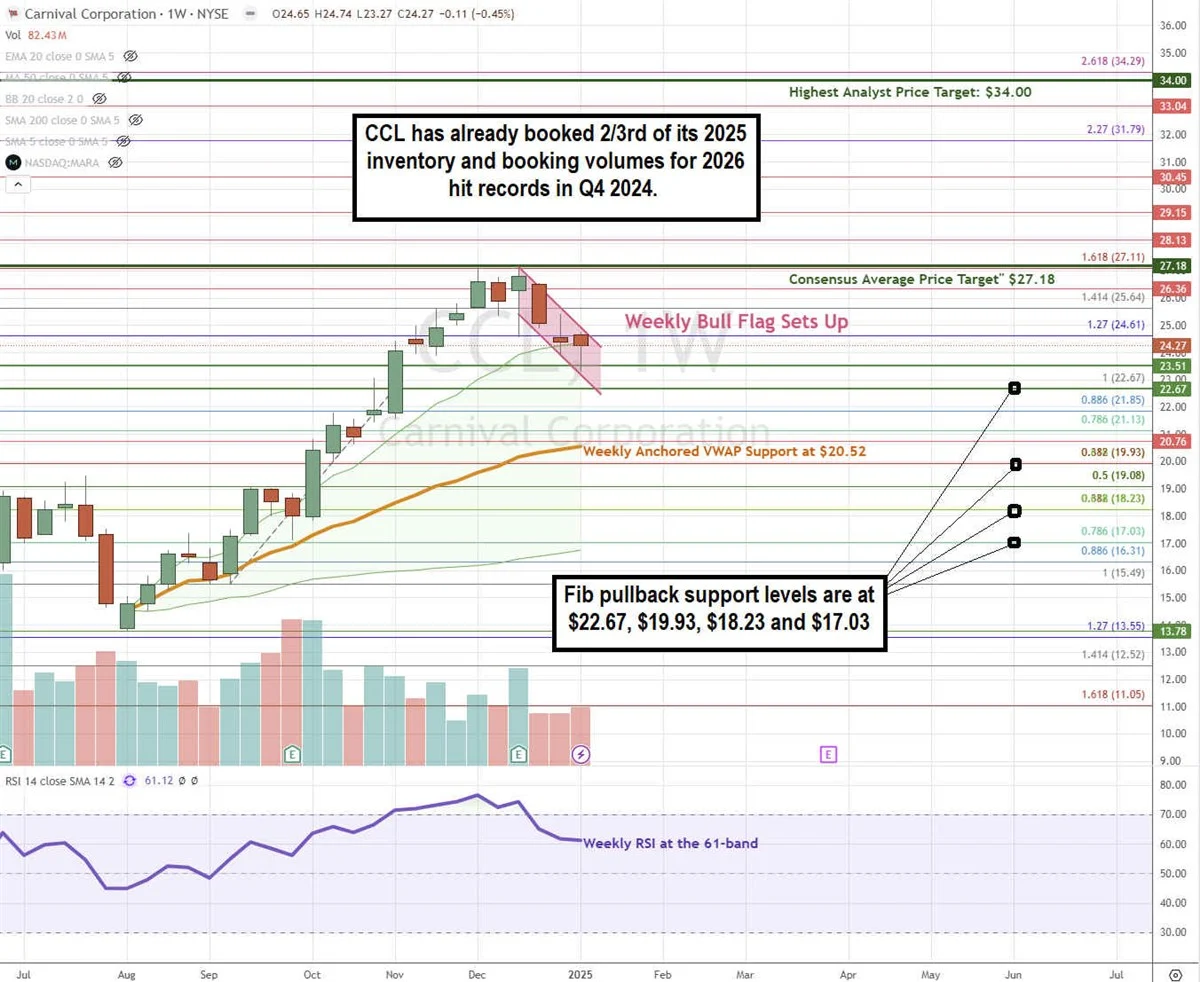Carnival (NYSE:) is the world’s largest cruise ship operator with a portfolio of nine cruise line brands. The consumer discretionary sector leader owns some of the most recognized brands, such as Carnival Cruise Lines, Princess Cruises, Holland America, Seabourn, Costa Cruises, AIDA Cruises, P&O Cruises, and Cunard Line. Carnival caters to all budgets, demographics, and lifestyles, from budget cruises to family-oriented cruises to posh luxury lines. The company wrapped up a record-breaking 2024 and set the bar low for 2025, which could springboard shares even higher. Here are four reasons to consider buying shares.
1) A Solid Q4 2024 Earnings Telegraphs a Stronger 2025
Carnival closed the year with a Q4 2024 EPS of 14 cents, beating consensus estimates by 6 cents. Carnival swung to a profit in 2024 from being in the red in the year-ago period. Revenues grew 10% year-over-year (YoY) to a record $5.94 billion, matching consensus estimates. Gross margin yields exceeded 2023 levels by 20% YoY.
Full-year revenue hit an all-time high of $25 billion, up 15% YoY. Adjusted EBITDA for 2024 notched a new record at $6.1 billion, up 40% YoY. Full-year operating income rose 80% YoY to $3.6 billion. Carnival drove strong pricing in 2024, which enabled the company to crush its initial 2024 guidance by $700 million and deliver nearly $2 billion more to the bottom line. Its adjusted return on capital invested (ROIC) rose 11% YoY. Carnival is already over 80% of the way toward hitting its 2026 SEA Change EBITDA and adjusted ROIC targets. The company said 2025 is shaping up to be another banner year, with yield growth expected to outpace historical growth rates.
2) Margins Should Expand on Lower Fuel Costs from Trump’s “Drill, Baby, Drill” Stance
The incoming Trump administration is committed to a “Drill, baby, drill” policy meant to beef up United States oil and gas production with the intent to lower energy costs in half in 2025. If this comes to fruition, it will expand operating margins for not just Carnival but also peers, including Royal Caribbean Cruises (NYSE:) and Viking Holdings (NYSE:). Lower energy costs mean more money in consumer wallets to book cruises, adding to an already overwhelming demand. Carnival also improved its net debt to adjusted EBITDA ratio to 4.3x.
3) Bookings Are Already Filling Up for 2026
Carnival’s new-to-cruise and repeat guests increased by double digits in 2024 as the cruising demographic continues to expand. Nearly 76% of Millennials and Gen-X-ers would consider a cruise vacation, according to a survey by the Cruise Line Industry of America (CLIA).
Carnival stated that its cumulative advanced booked positions for the full year 2025 are at an all-time high for both price and occupancy. Even with less inventory available, bookings made in Q4 for 2025 were even higher than last year. Nearly two-thirds of 2025 cruises are already booked and at higher prices. Booking volumes taken during Q4 going all the way out to 2026 continue to break records. North American and European segments are operating at the longest advanced booking windows on record. This reflects sustained demand for “even further out sailings.”
Carnival raised its Q1 2025 EPS guidance to breakeven versus a loss of 3 cents consensus estimates. However, full-year 2025 EPS may have been lowballed at $1.70 versus $1.75 consensus analyst estimates.
4) CCL Stock Is Forming a Weekly Bull Flag
A bull flag pattern is comprised of two parts. First, the underlying stock forms the flagpole, which is a steep run-up in the stock price, usually at a 45-degree or higher angle. The flagpole completes when the stock forms its peak. The flag is formed on the parallel descending trendlines comprised of lower highs and lower lows. The bull flag triggers when the stock surges through its upper descending trendline and past the peak of the flagpole.
The weekly flagpole peaked at the $27.18 swing high on CCL stock. A parallel channel comprised of a descending upper trendline resistance and lower trendline support formed the flag. A bull flag can trigger if CCL rises through the upper trendline resistance at the $24.61 Fib. The weekly anchored VWAP support sits at $20.52. The weekly RSI is flat at the 61-band. Fibonacci (Fib) pullback support levels are at $22.67, $19.93, $18.23, and $17.03.
CCL’s average consensus price target is $27.18, implying a 0.96% upside and its highest analyst price target sits at $34.00. It has 14 analysts’ Buy ratings, three Hold ratings, and one Sell rating. The stock has a 5.67% short interest.
Actionable Options Strategies: Bullish investors can consider using cash-secured puts at the Fib pullback support levels to buy the dip. If assigned the shares, then writing covered calls at upside Fib levels executes a wheel strategy for income.
#Carnival #Reasons #Set #Sail #Stock


